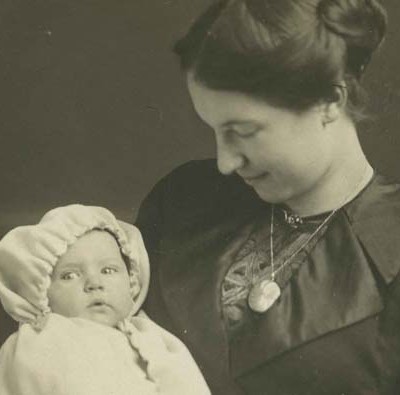
Harry (c.1889-1966) and Bessie (c.1890-1972) Buchman were raised in New York and lived in Duluth, Minnesota, before moving to Pittsburgh in the late 1930s.
They both worked for Charis Corporation, a manufacturer of ladies’ corsetry, based in Allentown, Pa. Harry Buchman was a distributor, and Bessie Buchman was an officer manager. Charis sold directly to consumers, sending trained female fitters to the homes of prospective buyers to take measurements for custom-fit corsets and girdles.
In Pittsburgh, the Buchmans lived in the Morrowfield Apartments on Murray Avenue in Squirrel Hill. The Charis office and showroom were in the Jenkins Arcade, downtown.
The Buchmans had four children, Arthur, Ruth, Daisy and Marcia.
Arthur Buchman (c.1920-1945) was finishing a degree at the University of Minnesota when his family moved to Pittsburgh. Shortly after graduating in early 1941, he enlisted in the U.S. Army and left for the Philippines. In August 1941, after arriving in Manilla, he was sent to the island of Corregidor. “It is supposed to be one of the most strongly fortified islands in the world and most certainly the strongest in the U.S. Army,” he wrote home in October 1941. With the attack on Pearl Harbor on December 7, 1941, Buchman found himself at the center of conflict in the Pacific Theater. The island fell in the Battle of Corregidor in May 1942, and Buchman became a prisoner of the Imperial Japanese Army.
Over the following three years, the Buchmans received infrequent postcards from their son, who was interned in Philippine Military Prisoner Camp No. 1 and No. 2. These typed postcards offered suspiciously optimistic updates about his health and mood, such as “Mother and Dad don’t worry – everything is fine,” but also contained cryptic and troubling details, such as a request to send regards to “George A Gainchang,” an anagram for “chain gang.” The final postcard arrived on January 23, 1945. Arthur Buchman had been killed about two weeks earlier when an American plane bombed a ship carrying him and other prisoners of war to Japan. The family learned of his death from an army telegram that arrived in July 1945. The army posthumously awarded Second Lieutenant Arthur H. Buchman a Silver Star for gallantry and a Purple Heart.
Ruth Buchman (c.1912-2005) rose to the rank of first lieutenant in the U. S. Army during World War II through her work as the head dietician at the Walter Reed Hospital in Washington, D.C. She received the Army Commendation Ribbon for her service.
After the war, Ruth Buchman married Irwin Roth (1915-1971). They lived in Pittsburgh.
In 1946, Harry and Bessie Buchman were founding members of Temple Sinai Congregation, with M.A. Baskind, Leon Falk Jr., David Glick, Louis J. Reizenstein and others. Buchman was the second president of the Reform congregation and oversaw the purchase of the Worthington Mansion on Forbes Avenue in Squirrel Hill to use as a synagogue. “Today, more than ever before, all Jews have a pressing responsibility for their lives and their beliefs,” he wrote to his fellow congregants in 1954 when he was managing the local effort of a fundraising campaign for the Union of American Hebrew Congregations and the Hebrew Union College-Jewish Institution of Religions.